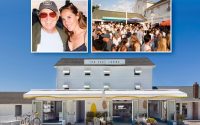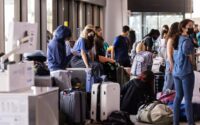Sleep tourism is on the rise — in the city that never sleeps
New York City may no longer be the city that never sleeps.
Studies have shown that nearly half of Americans suffer from sleep deprivation and many are ready to lay it to rest — even while traveling.
Since many prioritize a good night’s sleep while vacationing, hotels are not sleeping on the rising sleep tourism trend and are getting creative with their amenities and services — from bedtime charcoal lattes to AI-powered beds.
A majority of travelers across generations indicated that the top reason they plan to travel in 2024 will be to rest and recharge, according to Hilton’s 2024 Trends Report, which identified sleep tourism as becoming increasingly popular. And HTF Market Intelligence estimates the sleep tourism market to balloon to $409 billion by 2028.
“A main reason people will come back to the hotel is based on how well they slept,” Dr. Whitney Roban, a sleep specialist and collaborator at luxury bedding company REST, told The Post.
“They used to want to go for adventures and partying but now people want to go away to feel better and healthier — and the No. 1 way to recharge and recover is by getting good sleep.”
In The City That Never Sleeps, hotels are waking up to the news, offering luxuriously detailed sleep packages tourists have been dreaming of.
The Art + Science of Sleep by Equinox Hotels program, introduced by the brand at its Hudson Yards location in March, welcomes guests into a room that transforms into a dark, quiet and cool sleep chamber with the press of a button.
Priced at $1,850 for a minimum two-night stay, other amenities include temperature-regulating beds and sleep-inducing concoctions like bone broth, a bedtime charcoal latte and more.
There are also in-room guided breathwork programs and the Sleep Wave Table — something like a waterbed offering sound and harmonic resonance therapy. Equinox claims you can get the equivalent of three hours of sleep in 30 minutes through the regulation of neurotransmitters.
And to unwind before hitting the hay, the program also gives guests access to cryotherapy and hot and cold plunges on top of the healthy food, fitness and spa options typically offered to all Equinox guests.
“The whole integrated approach to high-performance living is that you want to be the best version of yourself and do everything you can to stay as healthy as you can to have a good life. And sleep is a huge part of it,” Chris Norton, the CEO of Equinox Hotels, told The Post.
fizkes – stock.adobe.com
“Yes, it sounds so obvious, but yet so many of us violate those basic rules.”
At the Park Hyatt New York, there are even AI-powered “smart beds” from Bryte that can “change from soft to firm within seconds” through pressure sensors that adjust to help you stop from waking in the middle of the night. There’s also guided meditation, soundscapes and music offered in the hotel’s Restorative Sleep Suites.
Of course, typical offerings for many hotels include blackout curtains, temperature control, noise machines, soft sheets, eye masks and late check-outs, but some inns are betting on sleep tourism outright.
Earlier this year, Refinery Hotels began bookings for its “Suite Dreams” package with a signature Refinery Hotel candle, a bottle of red wine, Alice Nightcap mushroom chocolate and Martha Stewart CBD gummies.
The Tempo by Hilton Times Square specifically designed its rooms with three zones for function and comfort, including an enveloping sleep environment to help guests unwind, and partnered with Sealy Accelerate mattresses to create a custom mattress as part of its newest sleep program.
And down the street, the Conrad offers guests a Byredo travel kit with pillow spray, eye cream, and facial toner and scented therapy balms as part of its updated “Goodnight Conrad” package
General manager Chintan Dadhich told The Post the ZZZ-themed package was in direct response to “a surge of traveler interest in wellness and sleep tourism over recent years. As we are in New York, a busy urban destination where sleep wellness often takes a backseat, it was important for us to find a way to create a sleep offering for our guests.”
While the trend has been bubbling recently, some institutions have taken their guests’ sleep seriously for years.
The Benjamin Royal Sonesta’s Rest & Renew Program was established in 1999 in conjunction with Dr. Rebecca Robbins, an instructor in medicine at Harvard Medical School and an associate scientist at the Brigham and Women’s Hospital. To encourage and support a good night’s rest, the program includes a pillow menu offering 10 high-end options including on-demand meditations, sleep-inducing food and beverage options and complimentary books to help guests doze off.
“People are finally now understanding and accepting the importance of sleep,” Roban said.


